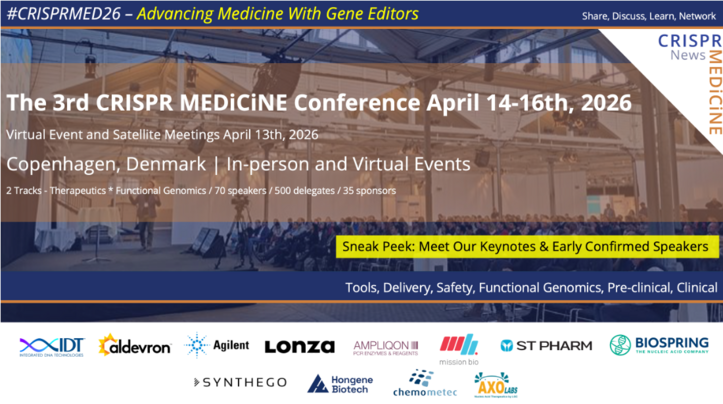FDA Clears First CRISPR-Cas13 RNA-Editing Trial for Macular Degeneration
HuidaGene Therapeutics announced on Monday that the US FDA has cleared its investigational new drug (IND) application for HG202, allowing the candidate to be tested in a clinical trial in patients with neovascular age-related macular degeneration (nAMD).
HG202 is the first-ever clinical-stage Cas13-based RNA-editing therapeutic candidate and the only clinical-stage RNA-targeting therapy for nAMD, an eye disorder that is caused by genetic and environmental factors. The pathobiology of nAMD is driven primarily by the perturbation of vascular endothelial growth factor (VEGF). Overexpression of VEGF leads to abnormal blood vessel growth and development in the eye, which is a hallmark of AMD. nAMD is one of the leading causes of blindness in older people, affecting almost 190 million people over the age of 60 worldwide.
Treatments that block the activity of VEGF can be effective in managing nAMD, however their therapeutic effect wanes over time - often because of non-compliance with a demanding treatment regimen that is associated with a range of complications - and many patients lose vision during the 7th or 8th year of treatment. In addition, about half of all nAMD patients either poorly respond to anti-VEGF therapies or respond more weakly to the therapy over time. No treatment exists for these patients.
A novel treatment for major cause of blindness
HG202 is a Cas-13-based RNA-editing candidate packaged in a single adeno-associated viral (AAV) vector. It is developed using HuidaGene's proprietary HG-PRECISE® platform, and it works by locally reducing the expression of VEGF-A mRNA within the retina. The novel therapy is designed to treat nAMD patients who have become resistant to anti-VEGF treatment as well as patients who respond to standard therapies. In pre-clinical studies in laser-induced choroidal neovascularisation (CNV) mice – which is an established mouse model for nAMD - HG202 treatment reduced the CNV area by 87%, outperforming both anti-VEGF antibodies and AAV-anti-VEGF gene therapy. HG202 was previously evaluated in the SIGHT-I Phase 1 clinical trial, led by Prof. XiaoRong Li and his team in Tianjin Medical University Eye Hospital in China.
According to a press release published yesterday, Alvin Luk, Ph.D., M.B.A., C.C.R.A., Co-founder and Chief Executive Officer of HuidaGene said: “We chose to go to the FDA because HG202 demonstrated good results in the in-vitro, in-vivo preclinical studies and first-in-human ‘SIGHT-I’ trial. In September 2023, we dosed the world’s first novel CRISPR/Cas13 RNA-editing therapy in humans, and we recently presented preliminary data at the ARVO, ASGCT, EURETINA, and ESGCT this year. The rigor of our clinical data in China using a non-receptor binding pathway approach through Cas13 RNA editor to partially knock down the mRNA expression of VEGFA brings the potential to AMD patients.”
With IND approval from the FDA, HG202 will now be evaluated for safety and tolerability in the open-label, multi-centre, Phase 1, dosing-finding BRIGHT trial in patients with nAMD. affecting nearly 190 million people over the age of 60 worldwide. The primary endpoint of the trial is the safety and tolerability of HG202 at different doses after a single administration. Secondary endpoints include changes in best-corrected visual acuity (BCVA), central retinal thickness (CRT) measurement, and the need for anti-VEGF rescue injections.
Other recent updates
Allogene Therapeutics' ALLO-316 receives RMAT designation for treatment of renal cell carcinoma
Allogene Therapeutics announced in a press release published last week that its TALEN-edited CAR-T cell therapy candidate ALLO-316 has been granted the FDA's Regenerative Medicine Advanced Therapy (RMAT) designation for the treatment of CD70-positive advanced or metastatic renal cell carcinoma (RCC). ALLO-316 is being evaluated in the Phase 1 TRAVERSE trial, which is currently recruiting and is expected to enrol 120 adult participants, who will each receive a single dose of intravenously adminstered ALLO-316 after a lymphodepletion regimen comprising fludarabine, cyclophosphamide, and Allogene’s CD52 monoclonal antibody, ALLO-647. You can read more about how ALLO-316 is designed to treat RCC as well as previous updates from the TRAVERSE trial here.
Intellia's therapeutic candidate for hereditary angioedema progresses to Phase 3 following positive clinical data from Phase 2 trial
Intellia Therapeutics released new positive results from the ongoing Phase 2 trial of NTLA-2002 in hereditary angioedema (HAE) that further support the therapeutic candidate as a functional cure. NTLA-2002 is an in vivo CRISPR-editing therapeutic candidate designed to knock out the target gene kallikrein B1 (KLKB1) in hepatocytes. This gene encodes prekallikrein, a precursor of plasma kallikrein, thus its knockout permanently reduces plasma kallikrein activity and halts the production of bradykinin to prevent the painful inflammatory attacks seen in HAE. The latest trial data show that when administered as a single dose of 25 mg or 50 mg, NTLA-2002 reduced angioedema attacks and led to robust and sustained reduction in total plasma kallikrein levels in patients with HAE. The data were published in October in the New England Journal of Medicine. See the official press release for further details. Intellia announced earlier in October that it has initiated a global, pivotal Phase 3 trial of NTLA-2002 (HAELO) for the treatment of HAE. The trial is recruiting and will enrol 60 adult patients who will be randomised 2:1 to receive a single intravenous infusion of NTLA-2002 or a placebo.
We will continue to update you on the gene-editing clinical trials as new details emerge. In the meantime, can find all of our coverage on clinical-stage gene editing programmes here.
For a complete overview of current gene editing clinical trials, check out CRISPR Medicine News' Clinical Trials Database.
To get more CRISPR Medicine News delivered to your inbox, sign up to the free weekly CMN Newsletter here.
Tags
ArticleNewsClinical News UpdatesAge-related macular degeneration (AMD)Hereditary angioedema, HAERenal Cell CarcinomaRNA editingCas13Allogene Therapeutics, Inc.HuidaGene TherapeuticsIntellia Therapeutics, Inc.
CLINICAL TRIALS
Sponsors:
Suzhou Maximum Bio-tech Co., Ltd.
Sponsors:
Zhejiang University







